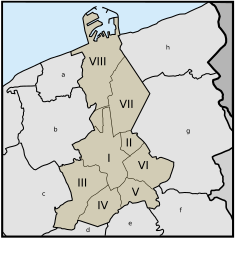Witches
Bruges (Dutch: Brugge; pronounced /ˈbrʏɣə/; French: Bruges pronounced / bʁyʒ(ə)/) is a Belgian city. It is the capital of the West Flanders province. Located in the extreme northwest of Belgium, 90 km from the capital, Brussels, it has a population of 117,000 in its urban core. The city does not have access to the sea, however, it is 20 km from the town of Zeebrugge.
Its name comes from the West Germanic "Bryggia" ("bridges", "docks", "berths"). It is interesting to note that, in Dutch, «brug» means «bridge», and that this city bears the plural of this word as its name, due to the large number of bridges that exist in it.
The main attraction of Bruges is its old town, declared a World Heritage Site by Unesco in 2000. Although it has been largely rebuilt, this urban center is one of the greatest European attractions, since it keeps intact the structures. Like Amsterdam, Gothenburg and Hamburg, among others, Bruges is known as "the Venice of the North", due to the large number of canals that cross the city and their beauty.
History
Bruges has been a city since the 11th century century. Towards 1050, the constant sedimentation was closing the important exit of the city to the sea. Fortunately, a storm in 1134 created a natural outlet channel. This fact and the important and emerging wool industry made the city grow enormously, building its walls under the patronage of the counts of Flanders. The city's entry into the Hanseatic League, a trade federation of cities from Germany, Scandinavia and the Netherlands, only brought more benefit to a city that became one of the wealthiest in Europe.
The entry of Flanders as part of the Kingdom of France in 1297, and the resistance to accept the policies coming from the crown by the Flemings, resulted in an increase in social tensions, which worsened with the imprisonment by the of Felipe IV of France from the count of Flanders and the appointment of a new governor.
On May 18, 1302, after being expelled from their homes to welcome the troops of the French army, the people of Bruges returned to the city, instigated by Joan Breydel and Peter de Coninck, and murdered any Frenchman that they managed to find. Legend has it that they identified the French by making them pronounce the phrase "schild ende vriend" (shield and friend), a very identifying phrase due to the pronunciation of the inhabitants of the region. Apparently, the French had a lot of difficulty pronouncing the sound [sx] from schild. This massacre is known as the Witch Matins.
Philip IV of France sent a force to put down the insurgents, facing them and the forces of the Count of Flanders at the Battle of the Golden Spurs, in which the French suffered a tremendous defeat. The establishment of Felipe III, the good one with his court in the city, brought important cultural prosperity to the city in the XV century . At this time they were in exile in the city Ricardo III and Eduardo IV of England. Also at this time William Caxton printed the first book in English in Bruges. Venetian and Genoese merchants, such as the Arnolfini, arrived in the city in 1314 and in 1409 created the first stock market.
In 1477, after Charles the Bold died in the battle of Nancy, the city became part of the Habsburg Netherlands, suffering the consequences of the War of the Burgundian Succession. Maximilian I restricts the rights of the city, which falls into decline, in favor of Antwerp.
During the Eighty Years' War, it was held by the Dutch, from 1577 until May 20, 1584, when it passed to the Spanish Netherlands.
Administrative organization
|  |
Demographics
Evolution
The following graph reflects the demographic evolution, including municipalities after the merger took place on January 1, 1977.
| Graphics of Demographic Evolution of Bruges between 1846 and 2020 |
 |
Transportation
| Airport | IATA Code | ICAO Code | |
|---|---|---|---|
 | Ostende-Brujas International Airport | OST | EBOS |
Culture
Bruges was declared in 2002 as the European Capital of Culture, together with Salamanca. The action movie In Bruges was shot in Bruges. The well-preserved old town of Bruges was declared a UNESCO World Heritage Site in 2000. In this old town, whose history dates back to the Middle Ages, the neo-Gothic style reigned in the XIX and much of the city was rebuilt in the said style.
Education
Sports
Bruges was one of the venues for the Euro 2000 soccer tournament.
| Equipment | Sport | Competition | Stadium | Creation |
|---|---|---|---|---|
| Club Bruges KV | First Division of Belgium | Jan Breydel Stadium | 1891 | |
| Cercle Bruges KSV | First Division of Belgium | Jan Breydel Stadium | 1899 |
Twinned cities
Bruges is twinned with the following cities:
- Burgos (Spain)
- Salamanca, Spain
European City of Culture
| Predecessor: |  European Capital of Culture (Together with Salamanca) 2002 | Successor: |
Notable people
Contenido relacionado
Capri
Târgu Jiu
Galician nationalism


